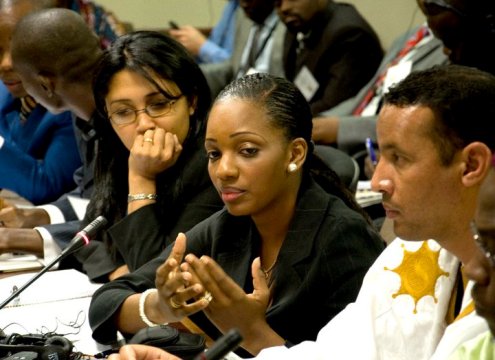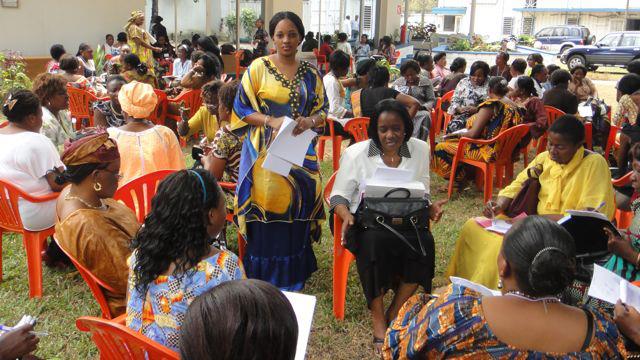Mali: "The struggle for women’s rights is not a straight line" says Mariam Diallo-Dramé, award winning campaigner and AFLED President
Mariam Diallo-Dramé, President of the Association for Women Leaders and Sustainable Development (AFLED) of Mali, and WLUML networker, received the Medal of Merit, awarded by the Government of Mali in January. Here she talks to WLUML about her life and work.
What is your role with the Association of Women’s Leadership and Sustainable Development (AFLED)?
I am the founding President.
Can you describe AFLED’s work in Mali?
AFLED was established to support the emergence of a new generation of leaders. Women working in civil society have many years’ experience and we empower them to share that with us to guarantee the survival of the fight for women’s rights. AFLED has five target areas: leadership, health, education, entrepreneurship and sustainable development. Since the crisis in 2012 we have done a lot of emergency relief work with refugees. Right now we are more focused towards peace making and creating job opportunities for women and young people.
How are things for women and girls in Mali now?
Women make up over half of the population. They are mostly illiterate but work a lot in the informal sector. The birth rate is very high, as well as maternal and neonatal mortality. Women have very little access to land and have very little purchasing power. Most of the female population is young and suffers from early marriage and incomplete schooling. We are targeting this demographic in our activities. The women are poorly represented in political life with only 10% in parliament, and we did not manage to win the vote over a law on quotas for women. The 2009 Family Law Code also withdrew a lot of women’s rights.
What do you like most about your work?
Every day I make a positive difference in the girls in the association. We have become a credible association in civil society which deserves its place. I love to create change, and I love helping others. When I see the refugee girls’ faces who are given work materials it’s really satisfying.
What are the difficulties in your work?
We spend a lot of time training members to direct projects or to represent AFLED. However we try to turn challenges into opportunities. What is hard for us these days is that with increasing Islamist influence in our society, Mali is losing its secular aspects and this hinders women’s emancipation.
Did your school encourage girls’ ambitions?
I grew up in a family where my mother prioritised our education. My father is from a conservative family, but he refused to have us scarred or married off too early. He believed in the advent of democracy in 1991 without asking anything in return. From an early age I was moved by the street children’s plights, and when I was 13 I set up an association to fight for children’s rights. Then I made my first steps towards the Children’s Parliament. After my studies I saw the difficulties of young people and especially young women. I thought that I could not just think about my own life and that I had to get involved.
What do your family and friends think of your career choice?
My parents were always a bit surprised by how young I was when I started out, but they always told me to do what I believed was right. Now I am married with three children and it is not always easy for them because work takes up a lot of time. I make a big effort to keep both aspects of my life in balance.
How did you manage to study in France and Canada and then meet President Obama?
I began studying law in France but it did not interest me and I wanted to deepen my understanding of political science. I then received a scholarship to go to Canada and I worked in student jobs to make ends meet. After I created AFLED, in 2010 the US State Department launched a request for young African civil society leaders to meet the President. My application was accepted and I went to the White House to share our vision with President Obama of the next 50 years for Africa. It was a unique experience which I will never forget.

Mariam Diallo-Dramé speaks to the Young African Leaders Forum in Washington. Photo : Mariam Diallo-Dramé.
Which living person do you most admire and why?
My mother. She always had energy to serve others. She is the one who checked our homework and expected us to be the best in our classes. She worked all her life as a poorly paid civil servant, but she wanted to work. Now she has retired and she is always available for her friends and family to share their joys and troubles. She taught me humility and how happy someone can be without many material things. I want to say thank you to her!
What is your biggest success?
I am most proud of my marriage and my children, and I am a very satisfied wife and mother.
How do you relax?
I like sports, it does me a lot of good and it is a great investment in my health!
Tell us a joke?
I arrived at a meeting for female politicians in Johannesburg when I was the regional coordinator of iKnow Politics. I went into the room and sat down next to a lady. She said ‘Well where is the famous Mrs Dramé then?’ I told her that I was Mrs Dramé, and she said ‘but that’s impossible, you’re too young!’
What qualities do you think a female leader needs?
Humility, generosity and courage.
What do you think is the future of women’s rights in Mali?
In all honesty we are living in very difficult times. But we hope that the economy will pick up, that girls’ education will progress and that women will continue being emancipated and will participate in Mali’s development.
What are you priorities for 2015?
I want to continue developing and strengthening AFLED. I also want to contribute to the research and consolidation of peace in Mali.
How can international networks (like WLUML and WELDD) support female activism in Mali?
I would say a huge thank you to WLUML, to Fatou Sow, Codou Bop and Doaa Abdelaal, who have introduced me to these formidable women. WLUML already helps us a lot with advice and support. I hope they continue to do so.

Training event for female politicians in Democratic Republic of the Congo. Photo : Mariam Diallo-Dramé.
Do you have any advice for our activists in other countries?
I would tell them to hang on, and that the struggle for women’s rights is not a straight line. We can have painful moments, but we remain standing and strong because we are women, we are life.


